BODHI MANDA ZEN CENTER: A Respite from the World Too Much With Us
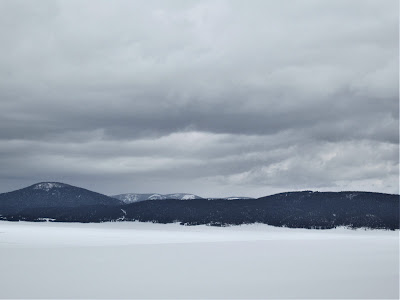
The drive out of the canyon towards Santa Fe – where we think we’ll end up by evening – takes us up to a higher elevation zone where yesterday's storm is evident and majestic pine tree forests reign, their boughs heavy and drooping with snow.

As we approach Capulin Volcano National Monument, I catch a glimpse of a fox, or maybe it's a coyote (hard to tell since he's such a lonesome speck in the white wilderness) making his way across a barren stretch of snow-covered wasteland. I pull over to take a picture. The fox turns and looks back over his shoulder at me, then saunters off indifferently.

What a different world up here at 7500 ft. – but one which the Ancestral Puebloans knew well, for it is the world where they hunted game, felled trees, and escaped the brutal desert heat during the summer months.

It’s a longer drive than anticipated, so we turn south and head back into the Jemez Valley where we had been a few days before. Deja vu redux. How strange, after completing a thousand mile loop in just four days. Somehow, though, I knew we’d be back to again experience the luscious hot springs at Bodhi Manda Zen Center. Sure enough, that's where we're going.

Guided by that famous New Mexico light shining on red rock canyon walls that Georgia O’Keeffe rhapsodized about:
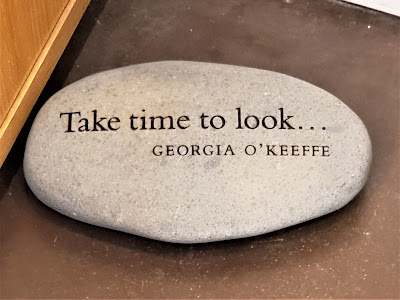
"All the earth colours of the painter's palette are out there in the many miles of badlands . . ."
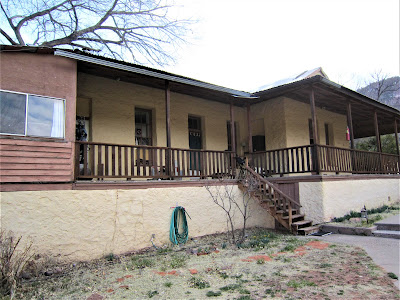
And following the pretty Jemez River winding its sweet way through dense thickets of brush and forest. We pull into the Bodhi Manda Zen Center just as Krishna Das winds up his devotional chanting we'd been listening to on NPR radio – perfect, felicitous timing.

Resident Zen Priest (osho), Abbess Jiun Hosen, immediately comes out to greet us. She seems about 50, and is donned in spiritual-holy vestments. Her shiny pate is shaved bald and seems to emanate a copper green patina. Her gentle eyes glow with a radiant calm, her demeanor at ease and airy.

She bows, hands pressed together namaste-style, and asks how she may be of assistance to us, obviously two quite weary stragglers. We wonder if she recognizes us from when we were here with a friend a week ago, when she'd come out to greet us in exact same fashion.

Not knowing the center was closed to the public – we missed the entrance sign proclaiming “Closed to the Public” – so we inquire hopefully about lodging for the night.

She says, why yes, we’re in luck, pure serendipity, even though a scholarly conference on religion and spirituality is taking place, with professors and experts from around the world in attendance, but our overnight stay is meant to be. There's an extra dorm room if we want it, for 50 bucks each.
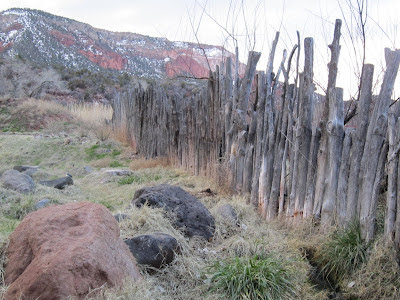
At first we balk, thinking, geez, a 100 smackers. She escorts us to an inviting room in an old wooden dorm building – it is charming and warm – and leaves us to consider. Let’s put this in perspective – what's 100 bucks for a beautiful experience, and all the hot soaking we can get for the night and the morning? (Is breakfast on the house?)

Compare this to our experience in Truth or Consequences, where we recently shelled out 60 bucks for a dumpy room, and another 30 for just one single hour in a private outdoor tub. I’ve come to hate the expression, but this is a no-brainer!
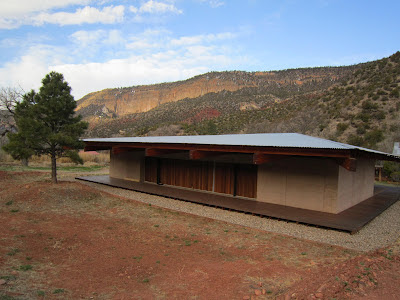
Hosen – she tells us to call her – has been a resident of the monastery for 30 years, we learn in an evening soak together (clothing mandatory). Her teacher, Zen Master Joshu Sasaki Roshi, she informs us, turns 103 on April 1, and has devoted the last 48 years of his life to teaching the dharma with boundless compassion, grace and patience.

I tell Hosen that my twin sisters share the same birthday. She seems delighted. (She has twin boys.) Our interaction is effortless and comfortable, like we're old soul friends. We ask her some questions about why she chose the monastic life. It's a common tale of wandering, searching, questioning, finding, she tells us in quiet, comforting, truthful tones.
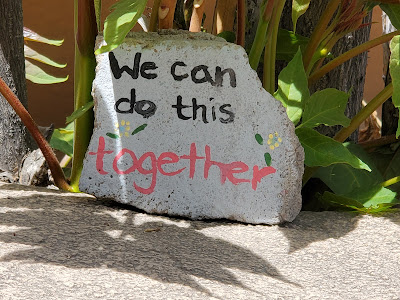
She had been a lost and confused young woman, she says, traveling the country, seeking, seeking what she knew not, when she happened upon an event hosted by the Zen Master. She was drawn by the Buddhist philosophy of learning:

" . . . to live the experience of mutually dissolving our self-centeredness, allowing for a new self to manifest itself in a new moment's time."

Established in the early 70's, with the help of one of his students, Michelle Martin, Roshi said, "You find hot springs, I come." The Jemez Valley is such a beautiful place, radiant with spiritual vibes, that Roshi said he would have come to live and teach here even if the attraction of hot, healing mineral springs weren’t part of what makes the place so special.

We ask her if she misses anything about the secular world. Not much, she says, having found ultimate peace and freedom from greed, desire, and fear of death. She also tells us that all her questions have been answered about the metaphysical nature of life and existence. In a calm matter of fact voice, she says, no, she has found her peace and place in a world where:
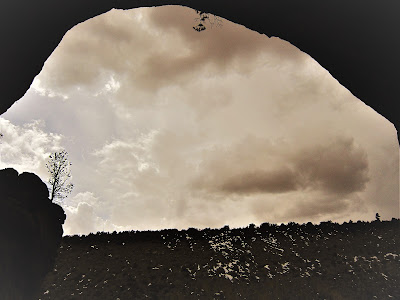
" . . . there are no more mysteries."
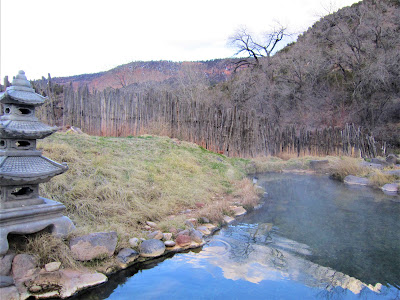
Hosen is gentle, serene, sweet, and loving, wanting nothing, trusting in everything. It is enough, she tells us, to live simply, pray simply, and immerse oneself in a variety of daily, humble activities:

" . . . through sewing, peeling garlic, digging ditches, weeding, feeding the birds, planting, chopping, washing dishes, washing windows, raking gravel, folding clothes."

It seems we become fast friends in that moment, enjoying one another, laughing and joking, breaking down the barriers of our intimate selves in what seems to be a deep soul connection, a spiritual, possibly karmic attuning. Probably all just a pleasant illusion.

This is called living Buddhism.
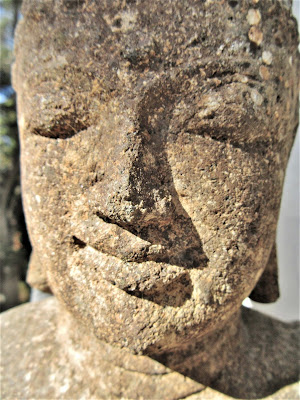

Some of the scholars, along with an assortment of oddball characters, cowboys, and regular folks are packed in the front room, watching on the big screen TV New Mexico State punish Montana in the first rounds of the March Madness college basketball tournament. Another group of six people are engaged in a rowdy game of poker. Lots of whoopin' and cheerin' and drunken revelry – quite a contrast from our peaceful zen retreat.
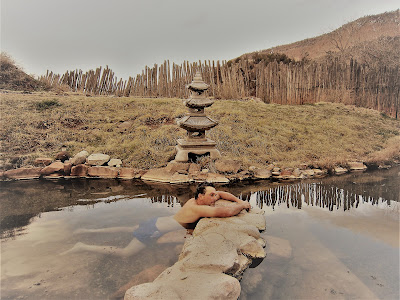
The next morning, after another wonderful soak in solitude at sunrise, with whirls of steam rising up out of the mineral pools lending the scene a Ridley Scott cinematic effect, Hosen proudly offers to show us the new Zendo meditation / prayer hall, eight years in the building.

.jpg)
Hosen proudly informs us it's entirely geo-hydro heated. She leads us to the back of the room, opens a closet door, and points to a Rube Goldberg-like tangle of newfangled piping and gadgetry that makes the ecologically friendly energy system work. As we're leaving, the conversation inexplicably turns toward getting old, suffering, dying, and how she recently cared for her mother and was there for her passage from this life.


Finally, with namastes and sincere expressions of thanks and gratitude, and heartfelt expressions – "we'll be back" and "see you next time, dear friend" – we take our leave. Please come back soon, Hosen whispers in our ear. I will always be here, unless, she sighs, she's in the LA area taking care of Roshi, or . . . dies.

I ask Hosen why the revered Zen Master doesn't return here, to his beautiful, peaceful retreat, to live out his final days. She nods, shrugs, and says if that is his wish and desire.

Postscript
This account was originally written in March 2010. In 2022, Jiun Hosen (Ranger) celebrated her 42th year at Bodhi Manda Zen Center as Abbess, guardian, and spiritual teacher. Joshu Sasaki Roshi passed away in 2014 at 107 years of age.
Upon Joshu Sasaki Roshi's death, it came to light that during his tenure as Zen Master, he had for many years been sexually abusing multiple dozens of women students and acolytes, accused of fondling them and manipulating some into sexual acts. Unfortunately, his loyal followers suppressed public knowledge of the Zen Master's vile proclivities.
In an article published in the Santa Fe New Mexican a couple of weeks after his death, a Zen teacher (osho) named Eshu Marti, who had studied with Joshu Sasaki Roshi for 13 years, wrote:
"For decades, Joshu Sasaki Roshi’s behavior has been ignored, hushed up, downplayed, justified, and defended by the monks and students that remain loyal to him . . . for many years, I have struggled with my own part in this calamity; I have known but have not spoken out."
Another osho ordained by Joshu Sasaki Roshi – Giko David Rubin – broke his silence as well:
"I have heard the experiences of 42 women, either from them directly or their husbands or boyfriends . . . [women told him that Joshu Sasaki Roshi] . . . implied that resisting his advances was resisting the cosmic activity itself. He also implied surrendering to his requests for sex may lead to the experience of absolute cosmic unity. He punished some women who would not capitulate to his demands by giving them little or no attention."
Rubin added that when Joshu Sasaki Roshi got wind of the printed allegations, he became furious and "slammed his teacup on the table so hard the cup broke."
It took more than a year before the Board of Trustees of the Zen Center issued a lengthy statement profusely apologizing, beginning with, "It is time – long past time – to break the silence around the wrong and harmful conduct of Joshu Sasaki Roshi."
The apology ends with the statement, "Abbess Jiun Hosen Ranger issued a personal apology also, earlier in June. You can read it here." (The link has been removed.)
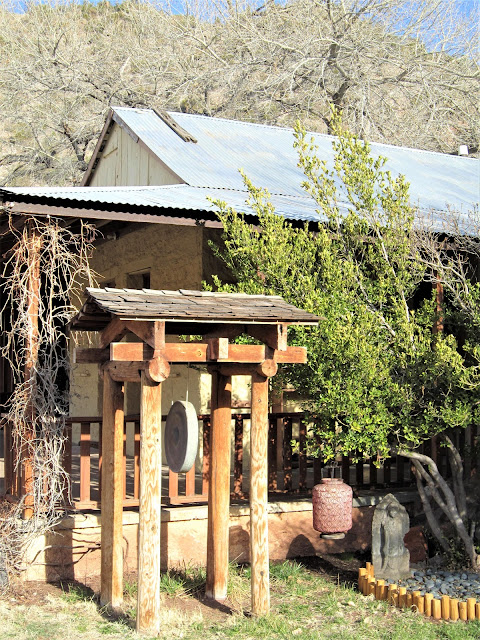

0 Comments:
Post a Comment
<< Home